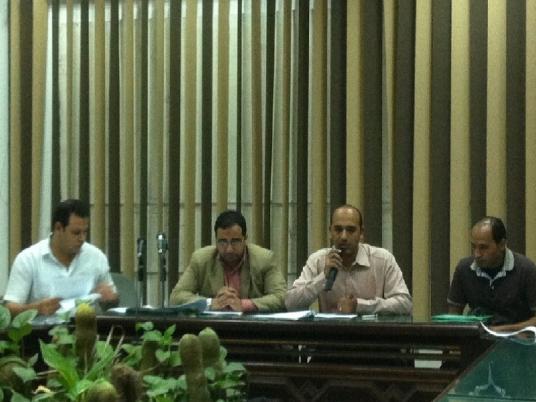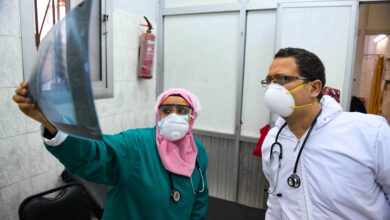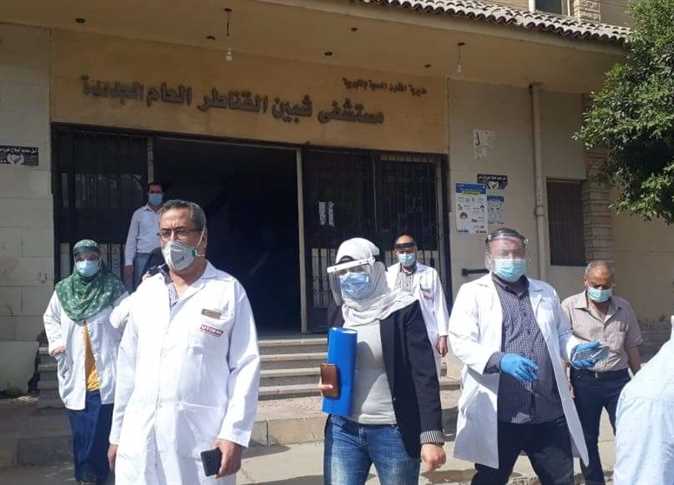
Doctors affiliated with the Muslim Brotherhood stormed out of a Doctors Syndicate meeting on Friday, after disagreements over a strike slated to begin on 1 October exposed a political rift within the syndicate.
Brotherhood members, including Syndicate Chief Khairy Abdel Dayem, walked out of the general assembly, at which more than 1,000 doctors were present, leaving the remainder to finalize plans for a strike in October. Before the Brotherhood doctors left, discussions were tense, and at times it seemed as if physical fights would erupt.
Among those calling for indefinite strike action were members of Doctors Without Rights, a non-partisan group which seeks to improve doctors' working conditions.
Mona Mina, a member of Doctors Without Rights and the syndicate board, called on the board to approve a partial but indefinite strike in all hospitals that fall under the authority of the Health Ministry, beginning on 1 October. The partial strike would leave emergency and maternity services operational, and allow work on Thursdays to treat patients with critical, ongoing conditions.
Doctors are demanding new terms of employment, including wages, and are calling for the Health Ministry’s budget allocation to be increased from 4.5 percent to 15 percent.
At the beginning of the meeting, Abdel Dayem said, “There are more than 50 or 60 institutions on strike [in Egypt] and the government has not responded to their demands. What will distinguish us from the rest is our ability to turn the doctors’ cause into a national one.”
His words were interrupted by an excited audience cheering in approbation and chanting, “Strike! Strike!” The syndicate chief announced his approval of the strike.
Doctors from the Brotherhood seemed dissatisfied with the mood of the meeting and, in speeches from the floor, sought to persuade the participants to limit the strike in various ways. Different Brotherhood speakers called for strike action to be limited to a week or a month, or to involve only a small portion of Health Ministry-run hospitals. However, the majority of doctors present insisted on an indefinite strike involving all such hospitals.
Afterward, the syndicate chief and Brotherhood members walked out of the room over disagreements on how to punish doctors who refuse to take part in the strike and who would represent the doctors in negotiations with the government. It was eventually decided that any doctors who crossed the picket line would be summoned to investigation by the syndicate. The Brothers, however, wanted there to be no penalties.
“I am against the strike and will not take part in it. Nobody can force me not to work. There are poor people who need our help,” said Abdel Fattah Rizq, secretary general of the syndicate and a member of the Brotherhood, screaming in the face of another doctor who accused him of acting against the wishes of doctors.
Sameh Nasr, another Brotherhood member, said the group had tried to compromise.
“We have been in meetings for three months and we have agreed with other movements on the strike and its mechanisms. We had disagreements on how to punish non-strikers and the composition of the strike committee,” he said. “All these mentions of the Brotherhood have delayed our progress. What has the Brotherhood got to do with what is happening now?”
“[Opposition to the strike] shows that the syndicate board does not want to face off with the government because they both belong to the Brotherhood,” said Amr al-Shoura, a member of Doctors Without Rights. “The Brotherhood is making use of the syndicate chief who won on their list. They’re claiming he is not from the Brotherhood. But he is loyal to them and he takes the decisions they want. But the syndicate chief does not have the right to oppose the decisions made by the general assembly, because the [executive] board has less power than the general assembly and cannot oppose its decisions.”
The general assembly meeting resumed despite the withdrawal of the syndicate chief and Brotherhood board members. Emtiaz Hassouna, a member of the board and Doctors Without Rights, said, “According to internal regulations, the general assembly may continue its meeting in the absence of the syndicate chief and members of the board, and the session is led by the most senior member in this case.”
The meeting ended with a vote in favor of an indefinite strike to begin on 1 October. The remaining participants also agreed on the membership of the negotiating committee, which had been another point of contention with Brotherhood activists, who were thought to be in favor of positions for their members, including Rizq, the syndicate's secretary general. After the meeting, members of Doctors Without Rights and around 300 syndicate members headed to the syndicate to stage a sit-in, which they later suspended on Saturday at noon in order to better prepare for the strike.
Taher Mokhtar, a member of the Alexandria syndicate board who participated in the sit-in, explained to Egypt Independent that the purpose of the sit-in was to reject the syndicate chief’s withdrawal from the general assembly, and to put pressure on the meeting between President Mohamed Morsy and several medical syndicates, which was taking place at the time.
Mokhtar added that the negotiating committee held its first meeting yesterday to look at mechanisms to implement the strike.
Later, the official website of the Doctors Syndicate announced that at a meeting with representatives of Egypt’s seven medical syndicates, Morsy approved a financial and administrative package improving the terms of employment for doctors and medical workers, and allocating LE700 million to finance bonuses and allowances ordered by previous ministerial decrees, but never paid.
However Shoura, the Doctors Without Rights member, noted that while a date for the implementation of the administrative package was specified, in June, no such deadline was specified for the payment of the financial package. He said he believes that the announcement represents no real concession on the financial front, and was only made to defuse preparations for the strike.
Translated from the Arabic by Dina Zafer




